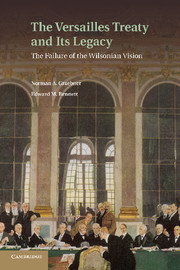Book contents
- Frontmatter
- Contents
- Preface
- 1 The International Order on Trial
- 2 The Road to Paris: 1917???1918
- 3 Versailles: A Study in Arrogance
- 4 The Retreat to Utopia
- 5 Manchuria and the Triumph of Non-Recognition
- 6 The Rise of Hitler
- 7 Challenge of the Dictators
- 8 The Elusive Response
- 9 Munich: The Continuing Escape from Reality
- 10 The Road to Prague
- 11 The Soviet Quest for Collective Security
- 12 The Coming of War: 1939
- Bibliography
- Index
Preface
Published online by Cambridge University Press: 07 October 2011
- Frontmatter
- Contents
- Preface
- 1 The International Order on Trial
- 2 The Road to Paris: 1917???1918
- 3 Versailles: A Study in Arrogance
- 4 The Retreat to Utopia
- 5 Manchuria and the Triumph of Non-Recognition
- 6 The Rise of Hitler
- 7 Challenge of the Dictators
- 8 The Elusive Response
- 9 Munich: The Continuing Escape from Reality
- 10 The Road to Prague
- 11 The Soviet Quest for Collective Security
- 12 The Coming of War: 1939
- Bibliography
- Index
Summary
Preface
This volume seeks to explain why the world required two massive world wars, with combined casualties reaching 65 million, to come to terms with Germany. The rise of the German Empire in 1870–1871 did not rest on external aggression; rather it emerged from the willing unification of several dozen historic German states under Prussian leadership. For centuries, these German principalities, amid their disunity, were vulnerable to the external encroachments of Austria and France, the Continent’s two major powers. German unification required the symbolic elimination of the powerful external influences of Austria in the Austro-Prussian War of 1866 and of France in the Franco-Prussian War of 1870–1871. Both wars, each lasting only six weeks and ending in the total annihilation of both the Austrian and French armies, ended the old European order and revealed Germany, with its powerful army, as the Continent’s dominant state.
Germany’s sudden acquisition of continental dominance required some adjustment of attitudes and roles in regional politics, especially in Britain and France. Such needed adjustments were not impossible. Germany’s dominance did not rest on conquest, although Germany annexed France’s Alsace-Lorraine along the German border in the 1871 treaty that ended the war. Germany’s dominance was largely endemic, resting on its location, size, resources, industries, and the qualities of its large population. None of these assets was based on conquest. The issue of 1871 was whether Europe would willingly coexist with these realities or seek to eliminate them with war – which was impossible.
- Type
- Chapter
- Information
- The Versailles Treaty and its LegacyThe Failure of the Wilsonian Vision, pp. ix - xiiPublisher: Cambridge University PressPrint publication year: 2011
- 1
- Cited by



